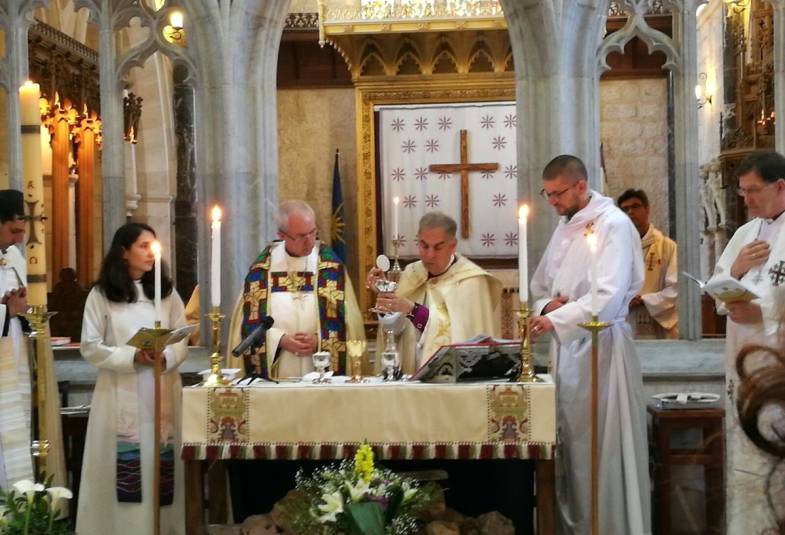07/05/2017

Peter 2:19-end; Acts 2:42-end; John 1:1-10
The experience of the church in this region has been of bring a suffering church for centuries. Sometimes life has been better, sometimes it is less bad. But the nature of suffering is that when it is happening it is all consuming. Every part of life is dominated by it. That is true whether you are a Christian or not, but in this region in addition to the suffering of war, conflict and the tragedies of death and injustice Christians especially are experiencing persecution, are especially threatened.
We have heard three bible passages, one about injustice and suffering, one about a community that in the midst of terrible times lived as the true body of Christ, experienced overflowing and abundant life, and the works of Jesus promising abundant life and salvation.
If you had asked Jesus' followers or hearers at the time of these words what he meant I suspect they would have answered much as we would or anyone around the world would today. Think about it for a moment, ask yourself, "what are the words and pictures that come into my mind when I hear the words 'abundant life'?"
For most people it is something about community, about stability and security, adequate food, no fear of the most basic necessities of life being missing. Perhaps one might add, "a good life lived so that at its end I know that I have had a purpose to life".
It's the picture we see in the Acts. Needs met, including spiritual. The apostles teach the truth, the people pray together. There is genuine friendship and companionship, people do not feel lonely and isolated. There is a profound sense of purpose, and the Holy Spirit of God is visibly at work.
Remember the context: they lived under a hostile government in a world of war. Their own leader had been murdered barely weeks earlier. Yet there is abundant life. The life of Christ changes everything, every aspect of our lives. It is not only in the areas of prayer and worship, not for the internal life of the church only.
As the passage says and Acts goes on to show in the next chapters it is a life that overflows into the community, to the poor and oppressed, and challenges the rich and the powerful and the unjust. It is more than words, it is abundant life.
Roll on a few years, perhaps 30, and Peter is writing about suffering to the churches of south west Turkey. They have been surprised by persecution, shocked by the scale of injustice. They live in a divided society, where perhaps 30% were slaves, including members of the church. Peter carefully links what he writes to them to the longest and most profound theme of the entire scriptures, that of the Shepherd.
The words he uses will lead us straight back to Jesus in John 10, our gospel reading. More than that they will have brought to mind all sorts of powerful images of suffering and salvation, of God's love experienced, and of the struggle to stay faithful, which run right through the scriptures.
What a hard saying this is! You know the fury of being treated wrongly. Even on a brief visit here, with very little understanding of probably the most complicated region of conflicts in the world, one sees the passions raised by suffering and injustice. Whether it is the utterly disrupted lives of the refugees in Zatari refugee camp last week, or the tears of the Iraqi Christians seemingly forgotten, one sees endless heart break.
In Gaza there is heroism from the doctors at the hospitals, from patients and above all groups of women, but also the very looming fears. In Nazareth, across Galilee you hear the voices of anger, or of fear and insecurity, of division and of the impact of almost a century of struggle of conflict, impacts that affect every inhabitant of the region, all of who tell their stories of fear, of struggle.
We must not take Peter's words out of context. We see in many places in the New Testament that the church resists injustice yet abundant life can never be built adequately except on the foundation of Christ. He is our shepherd, and sheep to be safe must follow the shepherd, or we will come to nothing and our desires, and even our good aims will crumble.
So the life of prayer, of reflection on scripture, separately and together, is essential. Abundant life is built on Jesus Christ as branches are part of the trunk of the tree. They cannot exist separately.
Abundant life is possible because Christ is risen. That is why this reading comes in Easter. The disciples who heard Jesus were surrounded by terror, hunger and hardship. His words are a declaration of the impact of his life, death and resurrection. These are the decisive words of God, of the shepherd who leads through the valley fo the shadow of death to pools of still water, of the shepherd who is good, who does not consume the flock, but grows and unites it.
The church carries within it the possibility of abundant life, and when the church roots itself in Jesus Christ and in obedience to Him then the abundant life spills out for the healing of the nations. Here in this region is a deep need for healing, for hope for righteousness of life, and for human dignity in security and without fear. The presence of Christians here both needs that abundant life if the church is to remain, but also is essential to the life and hope of this whole area. We pray for you, grieve for you, hope with you, and will seek in the best ways we can, to support you that we share the abundant life of Christ.